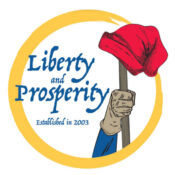Forgotten lesson of first Thanksgiving. Pilgrims began their colony as “progressive” Democrats. They didn’t start thinking like conservative Americans until after more than half died of starvation. “Liberty and Prosperity” became NJ’s motto in 1776 because Americans then knew from experience how liberty creates prosperity.
(From RushLimbaugh.com c/o Brad Thor)
Do you know the real story of the first Thanksgiving? What most people were taught is that the Pilgrims got to the New World, didn’t know what to do, the Indians saved them, and they had a feast. But that’s not what really happened.
On 1, 1620, the Mayflower set sail. It carried a total of 102 passengers, including forty Pilgrims led by William Bradford. On the journey, Bradford set up an agreement, a contract, that established just and equal laws for all members of the new community, irrespective of their religious beliefs.
When the Pilgrims landed in New England in November, they found a cold, barren, desolate wilderness. There were no friends to greet them, he wrote. There were no houses to shelter them. There were no inns where they could refresh themselves. During the first winter, half the Pilgrims died of starvation, sickness or exposure. When spring finally came, Indians taught the settlers how to plant corn, fish for cod and skin beavers for coats.
Life improved for the Pilgrims, but they did not yet prosper! This is important to understand because this is where modern American history lessons often end. Thanksgiving is actually explained in some textbooks as a holiday for which the Pilgrims gave thanks to the Indians for saving their lives. That’s not what it was.
Here is the part that has been omitted: The original contract the Pilgrims had entered into with their merchant-sponsors in London called for everything they produced to go into a common store, and each member of the community was entitled to one common share.” It was a commune. It was socialism. “All of the land they cleared and the houses they built belonged to the community as well,” not to the individuals who built them.
Bradford, who had become the new governor of the colony, recognized that this form of collectivism was as costly and destructive to the Pilgrims as that first harsh winter, which had taken so many lives. He decided to take bold action. Bradford assigned a plot of land to each family to work and manage. They could do with it whatever they wanted. He essentially turned loose the free market on them.
Long before Karl Marx was even born, the Pilgrims had discovered and experimented with what could only be described as socialism. And they found that it didn’t work.
What Bradford and his community found was that the most creative and industrious people had no incentive to work any harder than anyone else,” because everybody ended up with the same thing at the end of the day.
But while most of the rest of the world has been experimenting with socialism for well over a hundred years — trying to refine it, perfect it, and re-invent it — the Pilgrims decided early on to scrap it permanently.
What Bradford wrote about this social experiment should be in every schoolchild’s history lesson. ‘The experience that we had in this common course and condition tried sundry years… that by taking away property, and bringing community into a common wealth, would make them happy and flourishing — as if they were wiser than God.
For this community [so far as it was] was found to breed much confusion and discontent, and retard much employment that would have been to their benefit and comfort. For young men that were most able and fit for labor and service did repine that they should spend their time and strength to work for other men’s wives and children without any recompense.’
What he was saying was, they found that people could not expect to do their best work without any incentive. So what did they try next? Free enterprise. Every family was assigned its own plot of land to work and permitted to market its own crops and products. And what was the result? ‘This had very good success,’ wrote Bradford, ‘for it made all hands industrious, so as much more corn was planted than otherwise would have been.’
They had miraculous results. In no time they found they had more food than they could eat themselves. So they set up trading posts. They exchanged goods with the Indians. The profits allowed them to pay off the people that sponsored their trip in London. The success and the prosperity of the Plymouth settlement attracted more Europeans, began what became known as the great Puritan migration.
And they shared their bounty with the Indians. Actually, they sold some of it to them. The true story of Thanksgiving is how socialism failed. With all the great expectations and high hopes, it failed. And self-reliance, rugged individualism, free enterprise, whatever you call it, resulted in prosperity that they never dreamed of.
Happy Thanksgiving everyone.


